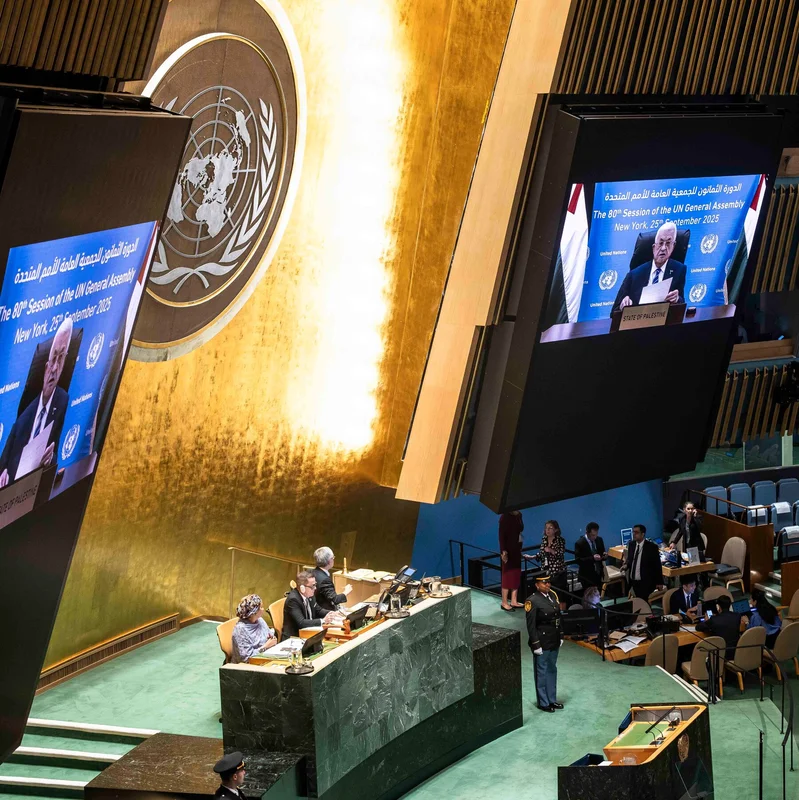In a pivotal address to the United Nations General Assembly on September 25, 2025, Palestinian Authority President Mahmoud Abbas declared that Hamas will have no role in governing Gaza after the war with Israel ends—a significant stance that signals a potential shift in Palestinian political dynamics .
Speaking via video from Ramallah in the Israeli-occupied West Bank—after the U.S. denied his delegation entry visas—Abbas condemned Israel’s military campaign in Gaza as “war crimes” while simultaneously distancing the Palestinian Authority (PA) from the October 7, 2023, Hamas-led attack on southern Israel.
🕊️ Key Quote: “These actions don’t represent the Palestinian people,” Abbas said of the Hamas attack. “We reiterate that we do not want an armed state.”
What Abbas Said—and Why It Matters
Abbas’s speech came amid a wave of international recognition for Palestinian statehood, with over a dozen countries—including Spain, Ireland, and Norway—formally acknowledging Palestine in recent weeks . His message had three core pillars:
- Rejection of Hamas governance: The PA must assume full administrative control of Gaza post-war.
- Call for disarmament: Hamas must “lay down its arms” as part of any future political arrangement.
- Commitment to diplomacy: Statehood must be achieved through peaceful, internationally backed means—not violence.
Political Context: A Fractured Palestinian Leadership
The Palestinian territories have been politically divided since 2007, when Hamas seized control of Gaza after ousting Fatah, Abbas’s party, which governs parts of the West Bank. This split has long undermined Palestinian unity and statehood efforts.
Governed by Abbas’s Palestinian Authority (Fatah-led)
Controlled by Hamas since 2007
Abbas seeks unified governance under PA authority
International Reaction and Challenges Ahead
While Western and Arab states welcomed Abbas’s rejection of armed rule, analysts caution that Hamas is unlikely to relinquish power voluntarily. The group still maintains significant military and social infrastructure in Gaza, even after 23 months of war.
Moreover, the PA faces its own legitimacy crisis:
- 📉 Abbas, 89, has not held elections since 2006
- 📉 Over 70% of Palestinians under 35 distrust the PA (2024 PCPSR poll)
- 📉 The U.S. and Israel have long criticized the PA for paying stipends to families of militants
Key Stakeholders in Gaza’s Future
| Actor | Position on Post-War Gaza |
|---|---|
| Palestinian Authority (Abbas) | Must govern Gaza; Hamas disarmed |
| Hamas | No public response yet; historically rejects PA authority |
| Israel | Opposes PA control; demands “demilitarized” Gaza |
| United States | Supports “revitalized” PA but insists on reforms |
| Arab League | Backs PA as sole legitimate representative |
What Comes Next?
Abbas’s speech may be the opening move in a high-stakes diplomatic endgame. With over 45,000 Palestinians killed and much of Gaza in ruins, the question isn’t just who governs—but who rebuilds.
For deeper analysis on Palestinian political unity, see our feature on the future of Palestinian governance after the Gaza war.
For authoritative context on U.N. recognition and statehood criteria, visit the United Nations Office for the Coordination of Humanitarian Affairs.




